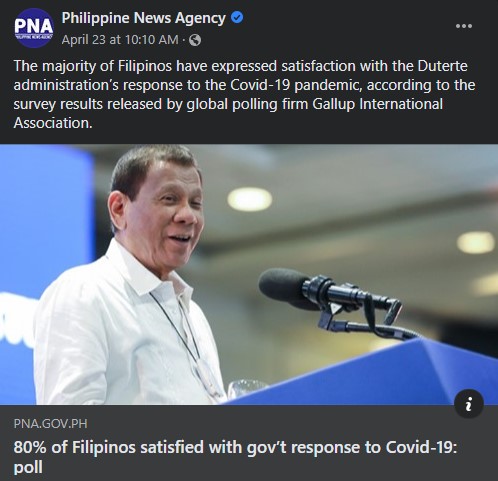GIA not Gallup Inc.: Parroting dubious surveys

PUBLIC OPINION polls are supposed to reflect the people’s sentiments. Thus, polls are an obvious source of information, reviewed and studied by interested parties, like governments, taking their cues from the public pulse.
When it comes to the satisfaction levels expressed about government performance, media reports should help the public understand the meaning of the findings, evaluating such information in the light of other circumstances which could also reflect aspects of public satisfaction or dissatisfaction. Reporting polls without analysis simplifies the rather complex matter of public opinion. These periodic readings can be easily misconstrued and can thus be used by vested interests to mislead.
The consistent high ratings of the Duterte administration, for example, have stirred certain expert groups to examine issues raised by poll findings. Are there circumstances that make polling results questionable? Polls are normally premised on a public that is well-informed, understanding issues and policies. There may be a need to check after all what people know about current events, about the conduct of government on sensitive and controversial matters, including, the reality of fear and the force of herd mentality and group think.
CMFR jeers news organizations that merely reported without context the recent survey results that said a majority of Filipinos are satisfied with the Duterte government’s COVID-19 response.
On April 21, polling company Gallup International Association (GIA) published the results of its second “snap poll” held from April 3 to 10 across 17 countries, including the Philippines. The respondents were asked about their level of satisfaction with their government’s response to the COVID-19 crisis, and other related concerns. According to the poll, 80% of Filipinos believe that the government is handling the crisis “well”. It also said 86% expressed willingness to “sacrifice some of [their] human rights” if it would help prevent the spread of the virus.
According to GIA, the survey had more than 17,000 respondents, of which 867 were from the Philippines. An online method was used in conducting the poll here through the Philippine Survey and Research Center Inc. (PSRC), a market research company, and GIA’s partner in the country. A quick look at PSRC’s website shows that it is a member organization of GIA.
Two days later, on April 23, the government’s official news arm, the Philippine News Agency (PNA), was first to report the survey and highlighted its findings on the Philippines. This advance notice should have raised some speculation about the purpose of the poll. True enough, the Palace would echo its own satisfaction. Also on April 23, an online report on the findings by the Manila Bulletin noted the statements by Presidential Spokesperson Harry Roque during a virtual press briefing on the same day. Roque called GIA’s findings “good news” and said that President Duterte will take it into consideration.
On the same day, the social media pages of some news organizations took note of the survey. Posts from The Philippine Star’s Facebook and Twitter accounts, as well as Philstar.com’s tweeted the survey findings, while a post in One News’ Facebook page referred to the PNA report and highlighted the purported satisfaction rating.
A brief report by the Inquirer.net on April 24 merely recalled Roque’s statements, taking its cue from the Palace.
Not one and the same
The Philippines is no stranger to public opinion polls. Journalists should be familiar with established polling firms, national and international. News articles that merely recited the results of the GIA polls did not, however, bother to check out the GIA, probably presuming it as an arm of the renowned Gallup, Inc., an analytics and advisory company based in Washington DC, which runs the Gallup Poll. But it is not.
CMFR reached Gallup for clarification about their views of GIA and the latter’s use of the Gallup name. Below is the official statement from Ken Anderson, Vice President – Law and Senior Counsel at Gallup:
“Gallup, founded by Dr. George Gallup, is known for collecting and analyzing the unbiased opinions of the world. Gallup International Association is an association of independent companies that are not affiliated in anyway with the world famous Gallup, which is headquartered in the United States and has offices around the world. The Association misleads the public by using the fame of Gallup. The Association and its members are not authorized to use the Gallup brand. Gallup has a number of lawsuits pending against the Association member companies.”
Treating poll findings as hard news, media report polling firm releases as promptly as possible and not bothering to get into the details, the accounts of which lack analysis. At times, the reports do not include details about the sample and the methodology used.
Curiously, the reports about Filipinos being highly satisfied with the government’s COVID-19 response did not try to connect the high ratings with the recent and current reporting on the crisis: the stories of slow action, delayed tests, the difficulties for the poor communities whose failure to observe social distancing and quarantine measures has been criminalized, the loss of incomes for daily wage earners, the long lines to receive the promised monetary assistance, only to be told they are ineligible. Reports failed to point out the obvious disconnect between the positive outlook claimed by the survey and the reality on the ground which the media have highlighted in their coverage of the government’s COVID-19 response in the past few weeks.
Leave a Reply